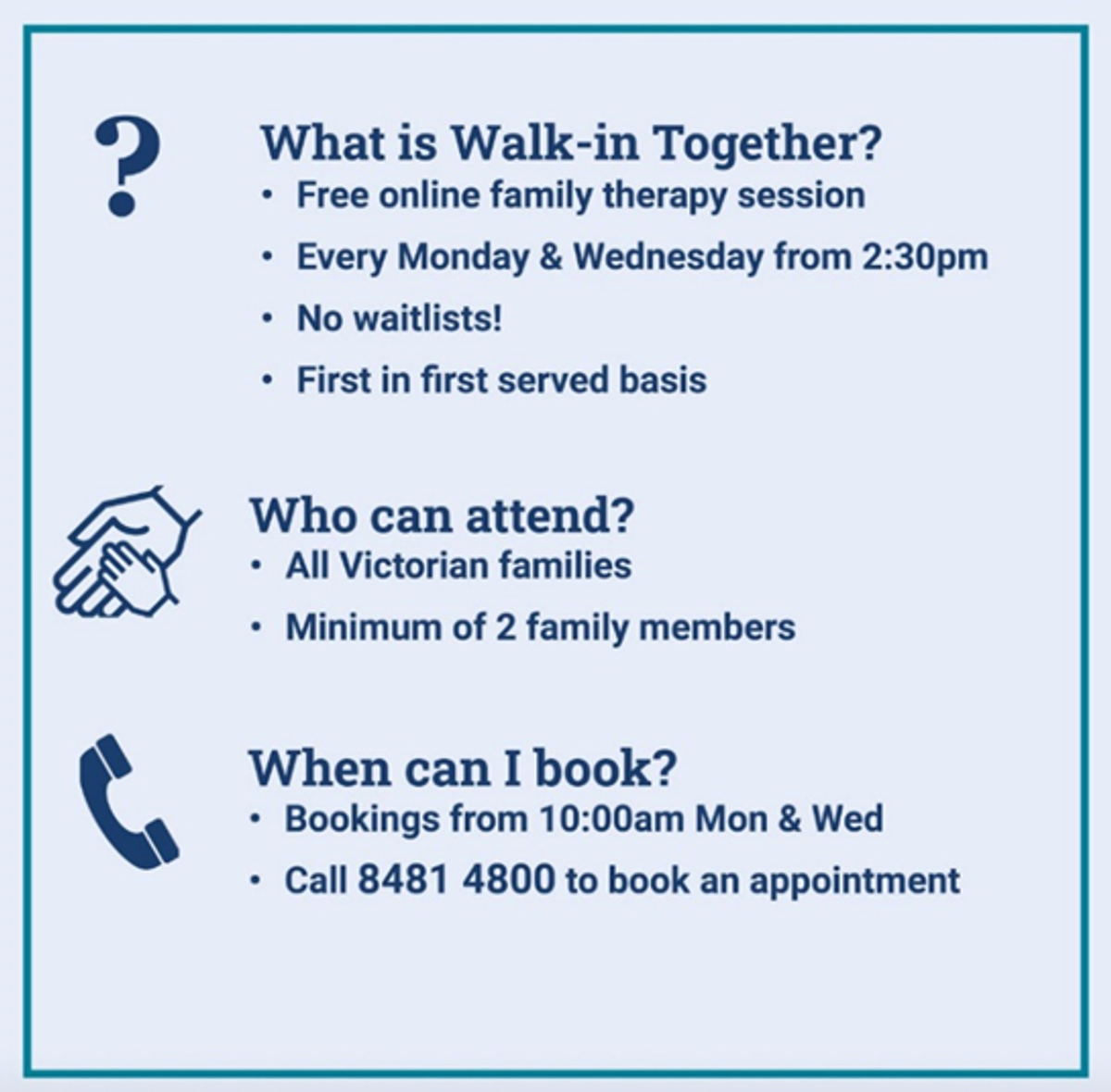Health & Wellbeing News

This term, Play has started for students in Grade 1 + Grade 2, and soon for Preps! It is being run by Briana (Speech Pathologist), Janine (AHA), Naanthini (Speech Pathologist) and Tess (Occupational Therapist). This term, we are focused on getting used to the new play room and routine, and completing our play assessments to help guide our program! We hope the students have a fun time.
FREE online Walk-In Family Therapy sessions with The Bouverie Centre
“When one or more people in a family experience difficulties, those around them are usually affected too. Family therapy can benefit individuals and the whole family. It gives an opportunity for all family members to share their thoughts and feelings, and to be part of the solution.”
The Bouverie Centre provide family therapy to families with their
highly trained family therapists.
They offer a free single-session walk-in service every
Monday and Wednesday from 2:30pm.
Sessions are inclusive of Aboriginal and Torres Strait Islander families, Culturally and Linguistically Diverse families, LGBTQIA+ families, families affected by mental health and addiction, families with disabilities, and “chosen families”.
They also offer longer-term ongoing family therapy.
Please note family therapy is not suitable when there is current family violence risk.
See flyer below for more information and visit The Bouverie Centre’s website.
Motion Changes Emotion
(The following article is an extract from an article written by Kate Ashton and was published on the 14th February on the ABC News Website.)
The research and the data on how one benefits from regular movement and physical activity is well documented. Recent research has also indicated that it can prevent the onset of common mental health conditions in the first place.
Concerned with declining mental wellbeing and an alarming rise in mental illness, particularly among younger Australians, experts say increasing the use of exercise for mental health should be part of the solution. Researchers believe that exercise can change the brain.
Last year, a group of Australian researchers published a review summarising what we know about the effects of physical activity on symptoms of depression, anxiety and mental distress in adults.
The scope of the study was large, and looked at previous reviews that captured the results of more than 1,000 trials involving 128,000 participants. It was peer-reviewed and published in the British Journal of Sports Medicine.
"What we found was that basically any type of exercise is effective for improving our mental health," said University of South Australia researcher Ben Singh.
Ben Singh says there's strong evidence for using physical activity to improve and treat mental health conditions.
The review found that using physical activity to treat mild to moderate depression and anxiety was more effective than conventional treatments like therapy.
"And on average, we found that it was about 1.5 times more effective than medications," Dr Singh said.
Exercise has also been shown to prevent the onset of mental disorders like depression.
"There is a lot of strong evidence to show that people who are regularly active over a long period of time have a lower rate of being diagnosed with a mental health condition," Dr Singh said.
The social element of exercise is believed to help protect against anxiety and depression.
Part of this is due to the sense of community and achievement physical activity can provide, the research suggests. Exercise has also been shown to trigger structural and biological effects on the brain.
While there's still more to learn, exercise has been proven to help reduce brain inflammation, promote the growth of neurons and trigger the release of mood-boosting chemical messengers like serotonin.
And even a small amount of physical activity can help. From tai chi to swimming, all exercise can bring benefits.
The researchers found that all kinds of physical activity could help relieve the symptoms of depression and anxiety, or distress. That included cardio such as walking, cycling, swimming, running, or playing a team sport.
Even low-intensity exercise like walking can improve mental wellbeing. Strength and resistance training was found to have the biggest impact on symptoms of depression. Mind-body exercises like tai chi and yoga were most effective at reducing anxiety and were shown to help with symptoms of depression too, the study found.
In general, the review found the more vigorous the exercise was, the bigger the improvement in mental wellbeing. "But what was important is we found that also low-intensity exercise — so just getting outdoors for a leisurely stroll — is still extremely beneficial," he said.
The national physical activity guidelines recommend adults aged 18 to 64 should aim to be active on most days, if not every day. The advice is to aim for 2.5 to 5 hours of moderate intensity physical activity and between 1.25 and 2.5 hours of vigorous physical activity a week. But Dr Singh's research found even those doing less than 2.5 hours of physical activity per week experienced mental health benefits.







